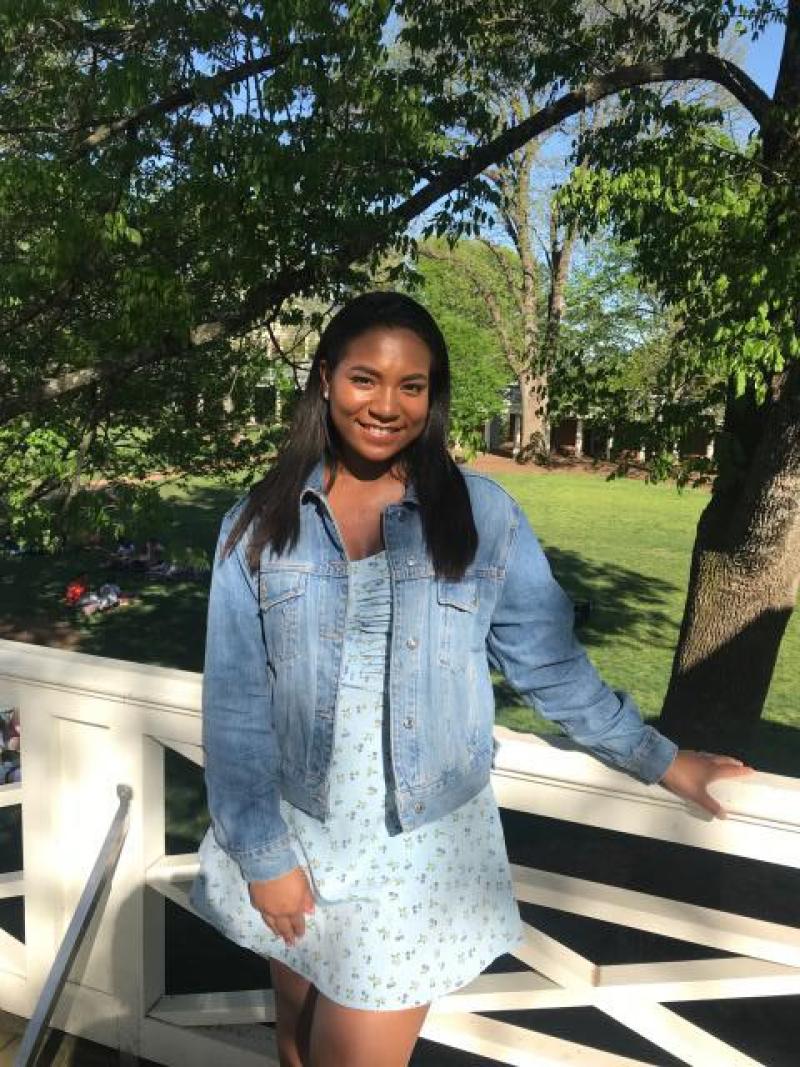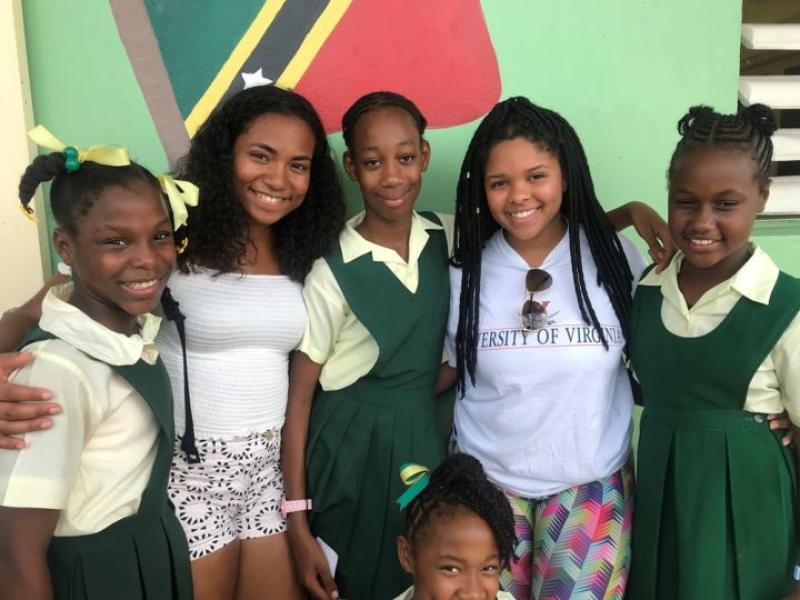Class of 2020: Pre-Med Grad Finds Her Purpose in Service to Others


Sydney Williams laughs as she recalls the “super focus” she brought to the University of Virginia as a first-year student. Graduating with a B.S. in biology, she still intends to attend medical school, after a gap year spent working as a medical assistant for a pediatrics practice in northern Virginia, but the pre-med studies that Williams assumed would consume her four years on Grounds had to share time on her packed calendar with a string of new passions and service opportunities that the 2019-20 Lawn resident discovered in college.
The early connections that she made as a Ridley Flagship Scholar — Williams received a highly competitive merit scholarship from an organization named after Dr. Walter N. Ridley, UVA’s first black graduate, in 1953, and the nation’s first African-American to receive a doctorate degree from a white Southern university — led to her interest in serving as a Peer Advisor through the Office of African American Affairs. Soon after, she became a Madison House program director for City of Promise, a Charlottesville tutoring and mentoring program that she helped start. Her facility with statistics led to her work as a lead biostatistics teaching assistant at UVA. Williams also worked as a medical scribe for the UVA Emergency Medicine Department until the end of February, when the coronavirus pandemic’s reach became more apparent.
And what began as an intellectually curious first year’s whim to add a philosophy seminar to her schedule eventually led to a minor in a discipline that has expanded the Echols Scholar’s outlook on the questions of access to health care and justice that she hopes to address in her medical career. Since packing up her Lawn room during spring break to complete her last semester back home in Haymarket, Virginia, she’s had time to mourn the loss of her final spring on Grounds, while also appreciating her UVA experience.
“I was just so focused when I arrived at UVA and thought that school would be the main reason I was there. I don't think I realized how much like I would enjoy being a part of the community and how much my relationships with friends, my professors and mentors and would mean to me,” Williams says. “My UVA experience was so much more than my studies.”
‘A Quiet Leader’
Maya Angelou’s poem “Phenomenal Woman” comes to the mind of Valerie Gregory, UVA’s associate dean of undergraduate admission, when she’s asked to describe Williams. Gregory first met Williams when she visited UVA in 2016 as a finalist for the Ridley Scholarship Competition.
“Sydney is a phenomenal woman who ‘doesn’t have to shout or jump about, or have to talk real loud. When you see her passing it ought to make you proud,’” Gregory says, paraphrasing Angelou.
As Gregory recalled from those scholarship interviews four years ago, Williams displayed a quiet nature that did not prevent her from expressing her thoughts with an integrity and respect that made her interviewers lean in and listen.
“Over her four years here, Sydney has been dedicated and helpful with our mission to recruiting a more diverse class. She’s made herself available to speak to prospective families, host students overnight and been there to answer questions in a genuine and honest way,” Gregory said. “Sydney has many accomplishments as a quiet leader, but what I will remember most is her heart — her heart to give, her heart to help, her heart to learn. I will miss our talks about next steps in her journey, her laughter and tears.”
For one summer break, Williams researched the effects of lysosome-based autophagy inhibitors — a potential treatment for acute myeloid leukemia — at Roswell Park Comprehensive Cancer Center in Buffalo, New York. During another, she studied public health in Guatemala through a UVA study abroad program; she also completed a global health study abroad program in St. Kitts & Nevis.

“One of the things that really stuck with me was you realize how different healthcare is in different countries,” Williams said. “You see all the factors that go into making healthcare decisions, and so much of it is dependent on cultural contexts for what kinds of services are offered, how they're offered and who can access them. It was really fascinating to see global public health and medicine interact in that way.”
Since December, Williams has been working as a research assistant in the UVA lab of Dr. B. Cameron Webb, an assistant professor of medicine and public health sciences and 2005 Echols Scholar graduate of the College and Graduate School of Arts & Sciences. Webb’s Health Equity, Law and Policy Research Lab (or HELPR for short) researches health policy issues related to health care access and health equity. In her role, Williams works on a project assessing the accessibility, value and sustainability of Medicaid programs in all 50 states and the District of Columbia.
“What’s interesting is that the students who work on it are usually in the last year of their master’s program, and Sydney picked it up as an undergraduate fourth year and really ran with it. It’s really been impressive watching her work,” Webb said. “I honestly think Sydney’s one of those rare students who whatever she puts her mind to, you know she’s going to accomplish it. She just has so much to add and contribute. And whether that’s through a clinical practice in medicine, taking care of one patient at a time, or whether that’s through designing public health or health care policy for large swaths of the population, she’s going to add value. Her heart to serve is evident, and I think she’s going to bring her thoughtfulness, her efficiency, her effectiveness and her leadership to whatever she does.”
Her work on Webb’s research project has Williams considering the possibility of working within the realm of public policy after medical school.
“Studying these statistics on how patients across the country are using and accessing Medicaid, it’s so timely, especially with the COVID-19 pandemic and the knowledge that people in many cases are not really able to access the care that they need,” she said. “It’s so important to get an understanding of how people in certain states are actually going to be able to access the care that they need if they’re not able to have health insurance, for example. Upstream, there are so many factors and systemic problems that prevent people from accessing care.”
Williams has wrestled with the philosophical underpinnings of these policy questions in the classes she’s taken with Elizabeth Barnes, a professor in the College’s Corcoran Department of Philosophy. Barnes calls Williams “the kind of student that professors dream about.” Williams is a front-row fixture in the philosophy seminars she’s taken, Williams adds, greeting comments and counterarguments from classmates with a smile and a slow nod.
“A lot of the classes that I teach are socially informed philosophy,” Barnes said. “I think what Sydney’s found most engaging are these philosophical questions about issues of social justice and issues of how we ought to treat people, … That’s what really motivates her. What she’s told me that she’s found most valuable about philosophy are the sort of normative questions about ‘how do we think about what health is, how do we think about what justice is with regard to health care, how do we think about social categories like gender and race and sexuality, and how they affect how people are perceived in contexts where there are power dynamics like the doctor-patient relationship.’
“She thinks a lot about those things, and I think a lot of what we’ve talked about in classes are things she wants to carry with her into being a socially informed doctor who cares about justice.”
Stretching Beyond Her Comfort Zone
Williams was looking forward to sharing more “S’mores Nights” with her friends this spring in her Lawn room as their time at UVA wound down, to laugh over their memories of past football tailgates, Lightings of the Lawn and other events. For now, though, she’s content with looking forward to the opportunity to walk down the Lawn wearing her cap and gown one day in the future, whenever the University determines the date for a traditional, in-person Final Exercises for the Class of 2020.
“I tend to be more reserved, but living on the Lawn really pushed me outside my comfort zone and turned into a really fun experience,” she said. “I didn’t realize how much I would value sharing my room with friends and inviting them over to make it their space as well.”
Whatever comes next, Williams has learned to leave open the door for new opportunities outside that once super-focused comfort zone.




